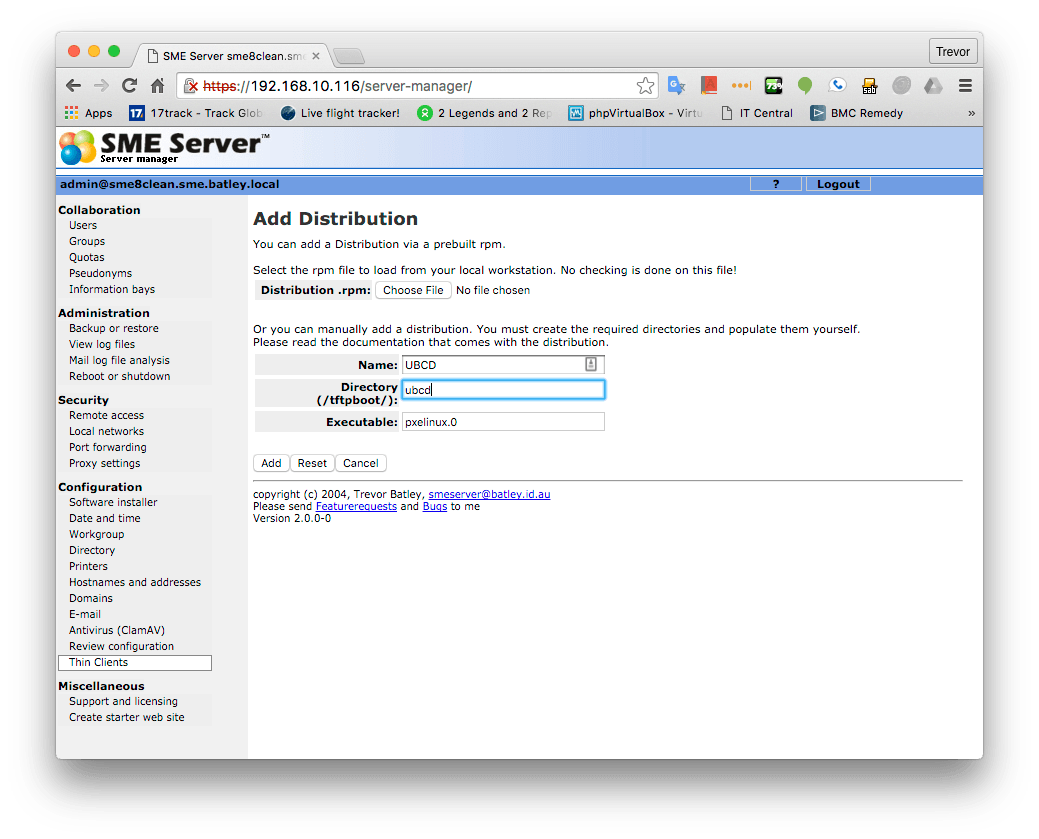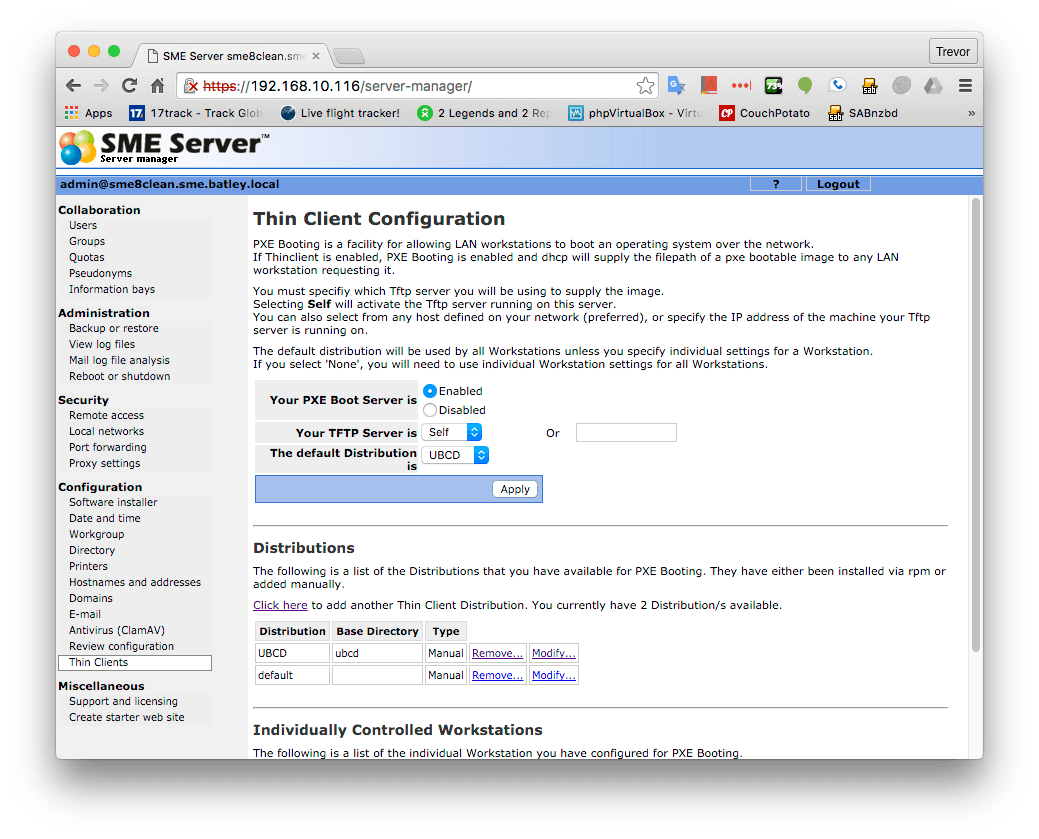Difference between revisions of "PXE via Thinclient"
| (7 intermediate revisions by the same user not shown) | |||
| Line 1: | Line 1: | ||
== Description == | == Description == | ||
| − | This is a description of how to pxeboot various operating systems | + | This is a description of how to pxeboot various operating systems/tools on devices connected to your network using the [[Thinclient|Thinclient]] and [[Tftp_server|tftp-server]] contributions. |
Hopefully, by using the files linked to here, and understanding what we have done, you should be able to add your own options/distributions for booting your devices. | Hopefully, by using the files linked to here, and understanding what we have done, you should be able to add your own options/distributions for booting your devices. | ||
| Line 11: | Line 11: | ||
Don't worry about setting any tftp-server parameters, as these are handled by the [[Thinclient_usage|Thinclient contrib]]. | Don't worry about setting any tftp-server parameters, as these are handled by the [[Thinclient_usage|Thinclient contrib]]. | ||
| − | == Universal Boot CD (UBCD) - the easy way == | + | == Distros / Tools == |
| + | === Universal Boot CD (UBCD) - the easy way === | ||
| − | I have created a sample set of files for deploying [http://www.ultimatebootcd.com/ UBCD] to your devices | + | I have created a sample set of files for deploying [http://www.ultimatebootcd.com/ UBCD] to your devices. |
| − | This uses memdisk | + | This approach uses the syslinux memdisk utility to boot the UBCD LiveCD over the network via pxelinux. |
Log into your server as root and make sure that you are in the /tftpboot directory | Log into your server as root and make sure that you are in the /tftpboot directory | ||
| Line 26: | Line 27: | ||
cp /usr/share/syslinux/pxelinux.0 . | cp /usr/share/syslinux/pxelinux.0 . | ||
cp /usr/share/syslinux/memdisk . | cp /usr/share/syslinux/memdisk . | ||
| − | Download the latest copy of the ubcd iso [http://www.ultimatebootcd.com/download.html | + | Download the latest copy of the ubcd iso from [http://www.ultimatebootcd.com/download.html http://www.ultimatebootcd.com/] into the /tftpboot/ubcd directory and create a link to it (my default file looks for ubcd.iso) |
ln -s ./ubcd<version>.iso ubcd.iso | ln -s ./ubcd<version>.iso ubcd.iso | ||
The current version at the time of writing this was ubcd535.iso, so: | The current version at the time of writing this was ubcd535.iso, so: | ||
| Line 43: | Line 44: | ||
Or, if you are more adventurous, boot individual workstations, as per [[Thinclient_usage#Workstations|these directions]] for Individually controlled workstations. | Or, if you are more adventurous, boot individual workstations, as per [[Thinclient_usage#Workstations|these directions]] for Individually controlled workstations. | ||
| + | |||
| + | Ensure that your device is setup to 'Boot from LAN', and away you go! | ||
| + | |||
| + | [[Category: Howto]] | ||
Latest revision as of 23:38, 28 March 2016
Description
This is a description of how to pxeboot various operating systems/tools on devices connected to your network using the Thinclient and tftp-server contributions.
Hopefully, by using the files linked to here, and understanding what we have done, you should be able to add your own options/distributions for booting your devices.
PXE Booting is a facility for allowing LAN workstations to boot an operating system over the network. A reasonable overview (and fairly detailed description of how to get it working) can be found at the PXELINUX site.
Pre-requisites
You will need to have installed the Thinclient and tftp-server contributions.
Don't worry about setting any tftp-server parameters, as these are handled by the Thinclient contrib.
Distros / Tools
Universal Boot CD (UBCD) - the easy way
I have created a sample set of files for deploying UBCD to your devices.
This approach uses the syslinux memdisk utility to boot the UBCD LiveCD over the network via pxelinux.
Log into your server as root and make sure that you are in the /tftpboot directory
cd /tftpboot
Get my preconfigured ubcd directory and expand it
wget --no-check-certificate http://batley.com.au/smecontribs/ubcd_pxelinux.tgz -O ubcd_pxelinux.tgz tar zxf ubcd_pxelinux.tgz cd ubcd
Copy in the required syslinux files (tftp cannot follow links outside of it's allowed directories, so you'll need to copy these in)
cp /usr/share/syslinux/pxelinux.0 . cp /usr/share/syslinux/memdisk .
Download the latest copy of the ubcd iso from http://www.ultimatebootcd.com/ into the /tftpboot/ubcd directory and create a link to it (my default file looks for ubcd.iso)
ln -s ./ubcd<version>.iso ubcd.iso
The current version at the time of writing this was ubcd535.iso, so:
ln -s ./ubcd535.iso ubcd.iso
Now you will have to setup the 'Distribution' in the Thin Client page under Server Manager, so that the client can boot from it.
Click on 'Click here to add another Thin Client Distribution', under the Distribution section. Fill in the details as below (Name = Anything you like, Directory = ubcd, Executable = pxelinux.0), and click 'Add'
You then need to tell Thinclient to use this 'Distribution' as the default
Or, if you are more adventurous, boot individual workstations, as per these directions for Individually controlled workstations.
Ensure that your device is setup to 'Boot from LAN', and away you go!

